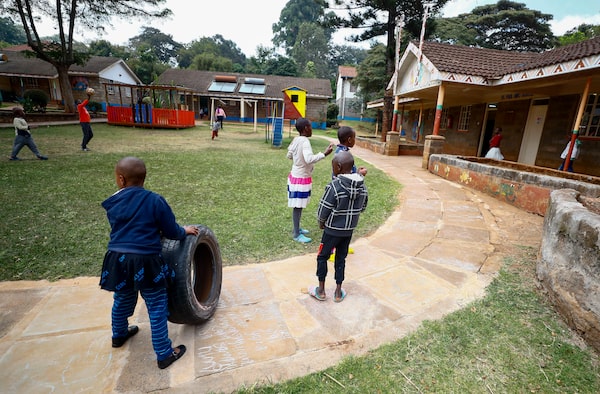
Children play at the Nyumbani Children's Home in Nairobi, Kenya on Aug. 15. The orphanage cares for over 100 children with HIV whose parents died of the disease and is heavily reliant on foreign donations and PEPFAR supplied anti-retroviral drugs.Brian Inganga/The Associated Press
African activists are rushing to the defence of a multibillion-dollar U.S. health program, fearing that a surge of attacks by U.S. Republicans and anti-abortion groups will endanger its supply of life-saving medicine for millions of Africans with HIV.
The President’s Emergency Plan for AIDS Relief (PEPFAR) has been a crucial source of health funding in Africa and across the developing world over the past 20 years, saving an estimated 25 million lives by providing nearly US$100-billion for badly needed HIV medicine, which would otherwise be unaffordable.
But despite its enormous success, PEPFAR has emerged as a political target in the supercharged and polarized atmosphere of today’s Washington, where Republicans have brought the abortion battle into a vast number of unrelated issues.
A growing number of Republicans, lobbied hard by anti-abortion groups, have been unwilling to vote for a normal five-year renewal for PEPFAR this year. Some have claimed, falsely, that the program is promoting abortions.
In a late-night vote on Thursday night, with the renewal deadline looming this weekend, the U.S. House of Representatives decided by a narrow 216-212 vote to give only a one-year extension to PEPFAR. The limited renewal could leave the program’s future in jeopardy, with officials unable to do long-term planning or hiring.
Representative Chris Smith, a Republican who has led the fight to restrict PEPFAR’s renewal, said the House vote had added new provisions to “protect unborn children” in PEPFAR spending, including a clause to “cut off large slush funds benefiting the international pro-abortion industry.”
Anti-abortion groups celebrated the vote on Friday, although it is unclear if the House vote would be upheld by the Senate. An anti-abortion site, LifeNews.com, called it a “huge pro-life victory.” It said the new provisions were “guardrails to protect the integrity of the program and the lives of vulnerable children in the womb.”
Faced with the growing threat to PEPFAR, hundreds of African health and religious leaders have been urging U.S. politicians to protect the program.
In a letter to Congress members this month, more than 300 African evangelical leaders and hospital officials said PEPFAR was vital to the goal of creating a new generation free from HIV and AIDS. They said there was no evidence that the program was promoting abortions.
“We assure the United States Congress that the claim that PEPFAR supports or promotes abortion is to us strange, unfounded and unfortunate,” the leaders said in the letter.
PEPFAR is perhaps most crucial to South Africa, where an estimated 7.8 million people are living with HIV, the largest number in the world. South African activists have been speaking up in support of the U.S. program.
Thabo Makgoba, the Anglican archbishop of Cape Town, said the creation of PEPFAR by the administration of former president George W. Bush in 2003 had shown Americans to be “caring and compassionate people” who saved millions of lives in Africa. “But that image of the United States now threatens to be replaced by one in which you present yourselves as primarily a military power, only interested in Africa as a battleground in your fight against international terrorism,” he told a UN side event in New York last week.
Salim Abdool Karim, director of the Centre for the AIDS Program of Research in South Africa, said the anti-abortion provisions supported by the Republicans are unrelated to anything in PEPFAR itself. “They’re just using this opportunity to push a political agenda on abortion that is now stalling one of the world’s most important AIDS programs,” he told South African public broadcaster SABC.
“They are using a very popular program, that always had bipartisan support, and hijacking it for a political purpose, and putting in peril treatment that’s been made available to millions of people in 55 countries that PEPFAR supports,” he said. “That’s what’s unconscionable about what’s going on right now.”
A failure to provide a five-year renewal to the program would not eliminate its funding overnight, but could reverse its long-term progress in reducing AIDS deaths, Dr. Abdool Karim said.
“We’ll see a resurgence in HIV, we’ll see more people stopping treatment, and that will lead to more drug resistance, and we’ll see more people progressing from HIV to AIDS,” he said.
The network of clinics and pharmacies created for PEPFAR has proven to be crucial infrastructure for combatting other diseases such as COVID-19, he noted.
John Nkengasong, the U.S. Global AIDS co-ordinator and former director of the Africa Centres for Disease Control and Prevention, said a failure to renew PEPFAR would endanger the goal of creating an AIDS-free generation by 2030.
“If we leave our eyes off the ball, the 20 million people that are receiving care today, within five weeks, the virus comes back,” he told a recent congressional event. “And within a couple of years, they start dying.”